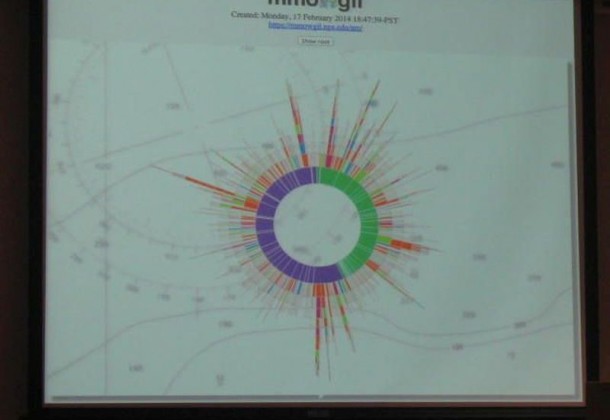NAWCAD Crowd Sourcing its Strategic Plan

The premise is simple: Two heads are better than one. Then SHAZAM, some folks go and bulk up that basic fact of multiplication with some algorithms and MMOWGLI is the product. Crowd Sourcing takes a function once performed by a limited, select, similar group, and outsources it to an undefined, diverse, large network of people.
The Patuxent Partnership sponsored a brown-bag briefing by Dale Moore and Karen Cooper to introduce the premise and the basic rules of a Massive Multiplayer On-Line War Game Leveraging the Internet. Next month Mr. Moore will introduce NAWCAD’s plan to put a MMOWGLI in place to address its strategic plan.
Just as its name states, it is a game. It is played on-line and anonymously (if you wish). There are cards to be played and game masters to nudge the play forward. There are paths that lead nowhere and paths that lead to solutions and paths that lead to more questions. It is known by its acronym, pronounced the same as Mowgli himself, familiar to fans of Rudyard Kipling’s Jungle Book and those of the Disney version. And like Mr. Kipling’s Mowgli, this homonym, the game MMOWGLI, also calls forth the most human quality from us all — our ideas, our ability to put dissimilar thoughts into a new solution.
“It is a message based game,” Ms. Cooper explained. In 140 characters players put one idea on a card. One thought on each card. Piles of meaningful cards grow, attrition abandons piles of non-meaningful ones. As the cards multiply, the algorithms sort and categorize. But the big deal is that lots of different people are contributing ideas.
The concept of crowd-sourcing has been applied in many ways, Wikipedia one of the best known examples. And although not perfect, Ms. Cooper said recent studies show it is proving a far more accurate and certainly more up-to-date encyclopedia than its written-word predecessors.
MMOWGLI, like Wikipedia, is a web-based collaboration tool. It was developed jointly by the Naval Post Graduate School and the Institute for the Future, which brings together the ideas of large, diverse groups. MMOWGLI games draw and harness the collective potential of the crowd and offer players a more gameful, democratized way of engaging with a scenario.
Crowd Sourcing is the engine that drives the game. Typically a function such as designing or planning is performed by perhaps a few dozen of maybe even the best and brightest, but nevertheless a limited, select, similar group. Crowd sourcing outsources the function to an undefined, diverse, large network of people in the form of an open call.
“The world is moving real fast,” emphasizes Mr. Moore. The elements at work are too vast and complicated to be resolved in old, linear manners.
The MMOWGLI model has been used to address “Wicked Problems,” Ms. Coooper explained. These are problems that require a complex, non-linear set of solutions, that are volatile and ambiguous. These are problems such as Somali piracy, as one concrete example. An early, private game addressed Somalia piracy, brainstormed for one week then spent two weeks developing ideas into action plans. Ultimately four “actionable, feasible, plausible” plans have been presented to the Pentagon as a result, she said.
To learn more about MMOWGLI, visit portal.mmowgli.nps.edu/nsc.
Next month, Sept 4, The Patuxent Partnership will sponsor the next briefing in Mr. Moore’s Strategic Thinking Series. Mr. Moore will elaborate on Crowd Sourcing the NAWCAD Strategic Plan using MMOWGLI. Mr. Moore is Director, NAVAIR Strategic Initiative Coordination & Execution, Assistant to Commander, NAWCAD for Strategic Operations.
The briefing will be held Thursday, Sept. 4, Check-in at 7:30 am, program 8 – 9:30 am at the Southern Maryland Higher Education Center, Building 2, Center Hall, 44219 Airport Rd, California, MD 20619
There is no cost for this program. Doors open at 7:00 am.























